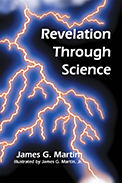
 |
Copernicus and Galileo are key historical figures who increased mankind’s knowledge of creation. Discord with the Church was a case of “observational science vs. natural philosophy.” The author briefly introduces other scientific contributions that led to acceptance of the Big Bang Theory, black holes, and light as waves vs. particles. Unlike other books on science vs. religion, Martin doesn’t stop discussions in the realm of physics. He proceeds to tackle evolution per Darwinism using his professional knowledge as a chemist.
The topics are divided into chapters that cover astronomy, physics, geology and paleontology, biology, and biochemistry. Tidbits to challenge and interest readers include: Darwin’s missing links and the difference between bottom-up and top-down Darwinists; development of the eye, which introduces the “irreducible complexity” problem; why hydrogen bonds permit ice to float; right-hand vs. left-hand crystals and DNA/RNA; “Abiogenist” suggestions on how carbon-based life forms came from non-living material. The author hints that we are not we alone in the universe.
Martin identifies himself as a theistic-scientist, one who believes in God without requiring scientific proof. He is an organic chemist who served twice as North Carolina's governor. In his 421-page book of topics—which can be read in any order—he breaks down complex information, so it is easily understood by the target audience: an educated non-scientist. He has also included a glossary explaining terms as well as an index and other research helps.
The author isn’t shy about giving his views, especially on controversies around evolution and the Earth’s age. A Young Creationist advocate will understandably disagree with these conclusions, but no one can critique the author’s professional approach. Martin advances that researchers do not need to agree; otherwise, “only one of us would have been given the ability to think.” And, after all, controversy sparks energy between scientific and religious groups, driving further research.
RECOMMENDED by the US Review